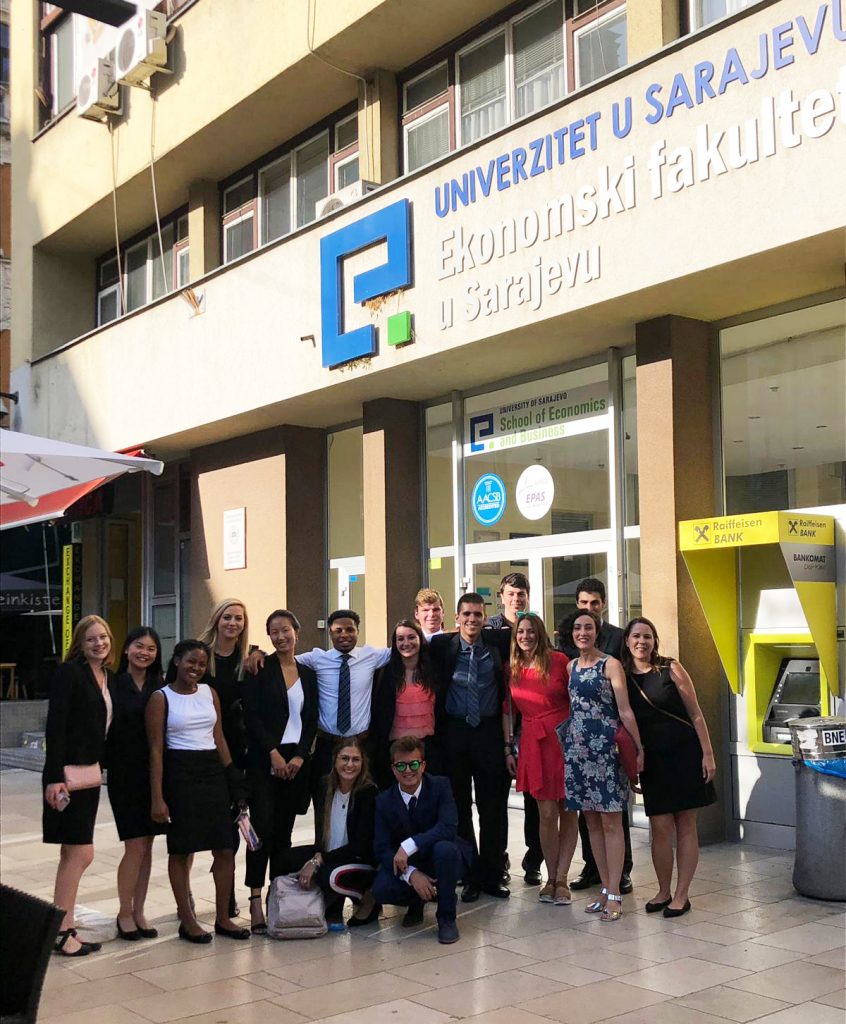Startup Consultants in Madrid and Sarajevo

This summer, students from Olin Business School at Washington University in St. Louis embarked on a comparative study of startup entrepreneurship in moments of transition. In Madrid, they considered the role of startups in the economic recovery that followed Europe’s “Great Recession.” Later, the group traveled to Sarajevo and analyzed the entrepreneurial environment in Bosnia and Herzegovina (BiH), a transition economy and emerging market with a complex post-war administrative structure.
The multi-city course, developed and led by professors Arantxa Narbona (University of Alcalá) and Selena Begović (University of Sarajevo), helped students to understand the role of the European Economic Area, its policies, and their impact on small and medium enterprises. Together with a historical overview of both countries, the course set the framework necessary for students to achieve their final academic goal: a consulting project aimed to provide Madrid and Sarajevo startups with professional consulting on a particular aspect of their young businesses. As student consultants, small groups worked to analyze two companies based in Madrid and Sarajevo – both operating in the same sector – and presented each with a series of recommendations to improve operations and guide future strategy.
With the support of local startup accelerators Tetuan Valley in Madrid and Mozaik in Sarajevo, groups analyzed the intricacies of launching and operating startups in these two very distinct countries. Central to the course was an understanding of the unique historical and economic environments in each country and their impact on the business ecosystem.
In this sense, few places are more intriguing than the second host-city, Sarajevo, a bridge between East and West, and a patchwork of Ottoman, Yugoslav and Austro-Hungarian buildings that represent the region’s complex history. Although devastated by war in the 1990s, the city’s historic center has now been beautifully restored, and the University of Sarajevo is the country’s largest and oldest university. These factors, along with a rise in highly skilled young professionals and ready investment from international organizations, mean fertile ground for startups.
Classes were complemented with several hands-on activities. Highlights included on-site lectures led by entrepreneurs and business experts, visits to museums and local companies, and a day in Mostar, a small city south of Sarajevo, still today divided between Bosniak Muslim and Croat Catholic communities occupying opposite banks of the Neretva River.
Students also participated in a workshop on post-war reconciliation initiatives as part of their introductory seminar on history and culture in pre- and post-war BiH. The workshop was taught by Maja Pecanac, an international human rights lawyer with experience leading reconciliation projects in BiH and Rwanda. Peacebuilder activist Amra Pandzo led an intercultural understanding exercise where students learned the difficulties of promoting a culture of peace in such a divided country.
This was Accent’s first customized program in Sarajevo, though it will certainly not be the last. In 2020, Accent recognizes twenty years of partnership with Olin Business School at Washington University in St. Louis, whose education abroad portfolio is characterized by experiential and comparative, multi-site learning. We could not be more pleased to continue developing such distinctive and dynamic customized programs together.
